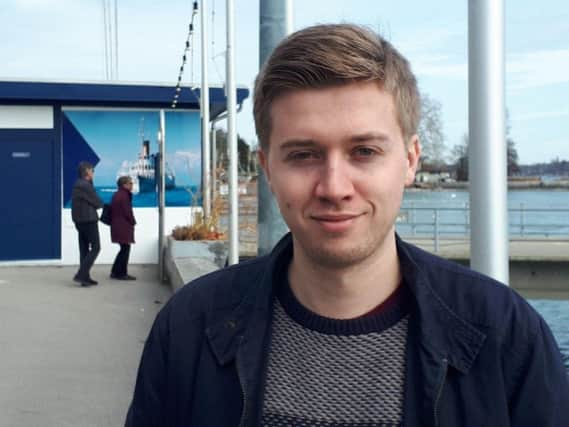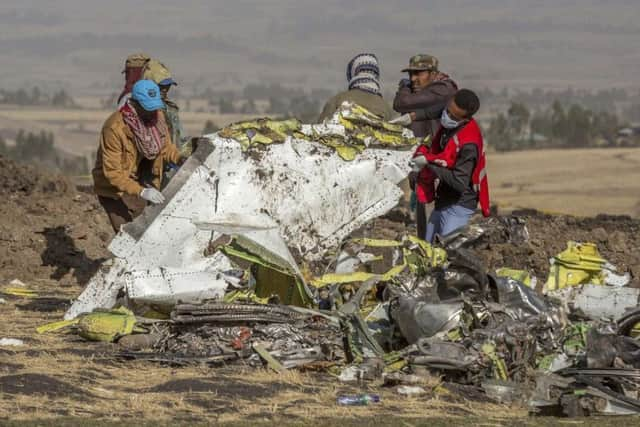Parents of air crash victim accuse aircraft maker Boeing of ‘playing Russian roulette’ with lives of passengers


As a BBC Panorama investigation, aired last night, claimed the US plane-maker may have cut corners to get their new 737 Max 8 airliner flying, Mark and Deborah Pegram blamed the company for not grounding the jet after an identical crash five months earlier.
“I think Boeing have some serious questions to answer,” said IT consultant Mark at home in Penwortham. “And the key one is why did they carry on flying the plane when they knew there was a fault?
Advertisement
Hide AdAdvertisement
Hide Ad“They have destroyed a lot of people’s lives. Our life will never be the same again.”


Refugee worker Sam, 25, was one of 157 people who died when the Ethiopian jet came down shortly after take off from Addis Ababa en route to Nairobi on March 10.
Investigators have suggested a potential design flaw in the plane’s anti-stalling system caused the crash - the same problem suspected of bringing down a Lion Air flight 12 minutes after taking off from Jakarta in Indonesia last October killing 189 passengers and crew. Since March the Max 8 has been grounded.
Mum Deborah, who says she will never fly on a Boeing jet again, said: “The Ethiopian crash which killed our beloved Sam was preventable. No-one will ever convince me otherwise.
Advertisement
Hide AdAdvertisement
Hide Ad“If it had been a genuine accident which no-one could have prevented then maybe, just maybe, it would have been slightly easier to accept.
“But to know they were already aware of a problem and they were already working on a way of fixing it when Sam’s flight went down is hard to take.
“There was always going to be the risk of it happening again. So they were playing Russian roulette with people’s lives.”
Sam, who worked for the Norwegian Refugee Council based in Geneva, was on a business trip to Kenya with a colleague when the crash happened.
Advertisement
Hide AdAdvertisement
Hide AdHis grieving parents say they have had an “horrendous” four-and-a-half months since the tragedy, trying to get information and documentation - including a death certificate - via the Foreign Office.
Sam’s remains have still not been identified by the disaster team working in Addis Ababa and it could be months yet before his family can arrange repatriation and a funeral back home in Penwortham.
So far the couple have not felt ready to take up an Ethiopian Airlines’ offer to fly them to the crash site.
Mark explained: “We’ve heard they have managed to identify between 60 and 65 of the 157 victims through fingerprints or other forensics. But not Sam.
Advertisement
Hide AdAdvertisement
Hide Ad“The authorities originally estimated it could take six months before we get an identification. We have given DNA samples and they have taken fingerprints from his bedroom and examined things like his toothbrush and hair brush.
“We have been notified they have found his passport and some of his (bank) cards, but that’s all so far.
“All we can do is wait. So that’s why we decided to have a celebration of his life at Vernons Sports Club on Friday.”
Sam was one of nine Britons on the ill-fated flight. All the families met for the first time in June when they attended a Foreign Office briefing in Whitehall, London.
Advertisement
Hide AdAdvertisement
Hide AdDeborah said: “Getting together with all the other families gave us come comfort. But I’ve got to say the Foreign Office staff were cold and lacked any real compassion.
“I came away feeling angry and frustrated. The way they dealt with bereaved families was not very good.
“The French victims were offered help within two weeks and their government took them to Ethiopia as a group, with a team of officials, doctors and psychologists.
“We’ve had nothing - we even had to pay our own way to London for the Foreign Office briefing. It’s been a real battle.”